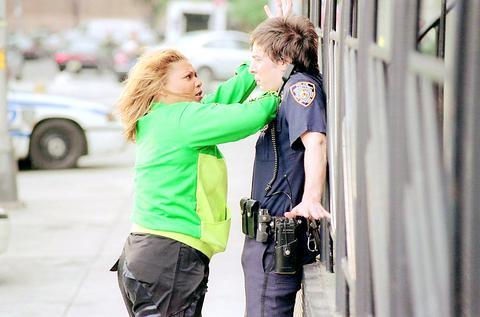A remake of a 1998 French film of the same name, Tim Story's Taxi is a bland, half-finished film that seems to have been conceived as off-peak cable fodder. Jimmy Fallon of Saturday Night Live plays Washburn, a New York City cop whose driver's license has been revoked after a number of traffic mishaps; summoned to a bank robbery, he impulsively hops a cab piloted by Belle (Queen Latifah), an aspiring Nascar driver who has customized her vehicle with a supercharged engine and a host of questionable modifications.
Belle likes driving fast, and Washburn likes being driven, so soon the two of them have formed an unofficial team. They set out in pursuit of the bank robbers, who turn out to be a gang of leggy Brazilian fashion models, led by fashion model Gisele Bundchen, making her first film appearance outside of a Victoria's Secret lingerie show.

In the original French film, which was written by Luc Besson (The Fifth Element) and directed by Gerard Pires, the Queen Latifah role was played by Samy Naceri, a popular French comedian of Algerian descent. It's interesting -- and a bit depressing -- to see how easily one country's ethnic cliches can be superimposed on another's.

PHOTO COURTESY OF FOX MOVIES
Here, Queen Latifah has been drafted (as she has been drafted many times before) to represent some kind of irrepressible life force, supposedly unavailable to uptight white folks. Her bursting ethnicity somehow liberates Fallon's character, a timid young man who lives next door to his alcoholic mother (Ann-Margret, in a bizarrely misconceived comic turn). By the end of the film, Washburn has been transformed into a daredevil driver in his own right, affirming life and liberty by endangering innocent pedestrians as he caroms like a billiard ball through crowded Midtown streets.
After a few routine car chases, Taxi ends abruptly, as if the director Tim Story, of Barbershop, had simply thrown in the towel without bothering to wait around for the tired resolution of the tired plot. It's as if he has walked out on his own film, something many viewers of Taxi will be tempted to do as well. Taxi has been rated PG-13 (Parents strongly cautioned) for some strong language and violence.


From the last quarter of 2001, research shows that real housing prices nearly tripled (before a 2012 law to enforce housing price registration, researchers tracked a few large real estate firms to estimate housing price behavior). Incomes have not kept pace, though this has not yet led to defaults. Instead, an increasing chunk of household income goes to mortgage payments. This suggests that even if incomes grow, the mortgage squeeze will still make voters feel like their paychecks won’t stretch to cover expenses. The housing price rises in the last two decades are now driving higher rents. The rental market

July 21 to July 27 If the “Taiwan Independence Association” (TIA) incident had happened four years earlier, it probably wouldn’t have caused much of an uproar. But the arrest of four young suspected independence activists in the early hours of May 9, 1991, sparked outrage, with many denouncing it as a return to the White Terror — a time when anyone could be detained for suspected seditious activity. Not only had martial law been lifted in 1987, just days earlier on May 1, the government had abolished the Temporary Provisions Effective During the Period of National Mobilization for Suppression of the Communist

When life gives you trees, make paper. That was one of the first thoughts to cross my mind as I explored what’s now called Chung Hsing Cultural and Creative Park (中興文化創意園區, CHCCP) in Yilan County’s Wujie Township (五結). Northeast Taiwan boasts an abundance of forest resources. Yilan County is home to both Taipingshan National Forest Recreation Area (太平山國家森林遊樂區) — by far the largest reserve of its kind in the country — and Makauy Ecological Park (馬告生態園區, see “Towering trees and a tranquil lake” in the May 13, 2022 edition of this newspaper). So it was inevitable that industrial-scale paper making would

Hualien lawmaker Fu Kun-chi (傅?萁) is the prime target of the recall campaigns. They want to bring him and everything he represents crashing down. This is an existential test for Fu and a critical symbolic test for the campaigners. It is also a crucial test for both the Chinese Nationalist Party (KMT) and a personal one for party Chairman Eric Chu (朱立倫). Why is Fu such a lightning rod? LOCAL LORD At the dawn of the 2020s, Fu, running as an independent candidate, beat incumbent Democratic Progressive Party (DPP) lawmaker Hsiao Bi-khim (蕭美琴) and a KMT candidate to return to the legislature representing